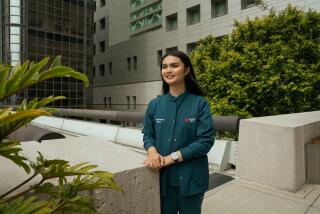Nurses, S.F. Hospital Clash Over AIDS Danger
- Share via
SAN FRANCISCO — Uncertainty about the spread of AIDS, which for some hospital workers is the most frightening aspect of that deadly disease, has sparked an emotional feud between San Francisco General Hospital and four of its nurses.
The nurses have complained to the California Occupational Safety and Health Administration that hospital rules meant to comfort AIDS victims also endanger nurses’ health.
Specifically, they complain that they are not allowed to wear masks, gloves and other protective gear whenever they are in contact with patients suffering from acquired immune deficiency syndrome.
No Danger Is Seen
Officials at the hospital, which has one of the most highly regarded AIDS treatment programs in the country, and a Cal-OSHA investigator, Dr. Lawrence Rose, deny any known danger to nurses. Indeed, they point to tests showing that hospital workers are no more likely than any other occupation to contract the AIDS virus.
Despite this, Rose said at a hearing earlier this week that he believes that nurses should be allowed to wear masks and gloves whenever they wish.
Hospital officials declined to comment publicly on Rose’s opinion until his agency issues a final report, except to say that no policy changes are planned until then. There are 600 nurses at the hospital, officials say.
Dianne Deinstein, a spokeswoman for the safety and health agency, said that Rose’s remarks were only “his opinion” and “may or may not have any bearing on what Cal-OSHA will eventually decide.”
Privately, some city health officials have accused the nurses of exploiting public fear over AIDS to “punish” the hospital for temporarily shifting them from light-duty, high-paying night shifts to routine daytime duty.
Indeed, the women have a separate case pending before the Division of Labor Standards Enforcement challenging their temporary reassignment. Their charges about hospital safety originally were part of the reassignment complaint.
The four nurses do not work in the hospital’s specially designated 12-bed AIDS isolation ward, which is staffed by volunteer nurses.
Instead, they work in other wards where AIDS patients are housed when the AIDS ward is full.
Currently, hospital officials said, 15 AIDS patients are housed in private isolation rooms outside the AIDS ward. These rooms, the officials said, are designed to contain the suspected AIDS virus, known as HTLV-3.
However, the nurses contend that AIDS patients are free to roam the halls, dine in public cafeterias and drink from water fountains. They also claim the bed linens from AIDS patients are not properly sterilized and that nurses are forbidden to wear gloves and masks when in contact with AIDS sufferers.
‘Right to Determine’
“We are not allowed to wear our masks on a common-sense basis,” one of the nurses, Julie Bernales, testified at a hearing of the state Department of Labor Standards Enforcement. “I believe I have the right to determine for myself when to wear protective clothing when facing a hazard.”
“We don’t mind taking care of them (AIDS patients),” another nurse, Norma Watson, said before the state hearing, “as long as they give us the option to protect ourselves.”
Hospital officials respond that they follow strict contamination guidelines drafted by the federal Centers for Disease Control in Atlanta, and point out that none of the hospital workers has shown any sign of exposure to AIDS.
AIDS patients well enough to leave their rooms, they said, must take proper precautions. Bed linen is sterilized when it is soiled by body fluids known to transmit the disease, they added.
In addition, nurses are allowed to wear gloves and masks whenever handling any such material capable of transmitting the virus or when dealing with AIDS patients known to have other, more easily transmittable diseases, such as tuberculosis.
At other times, hospital officials said, protective clothing is discouraged.
“It does become a big deal when people wear masks inappropriately,” said Grace Lusby, the hospital’s infection control coordinator. “It makes patients feel terrible and makes other people on the ward (worry). . . . Pretty soon you have 30 people on the ward wearing masks and the panic level goes up.
“When it’s casual contact, like helping someone into a chair,” she added, “it’s not necessary (to wear protective gear) because this is not a casually transmitted disease. We know that.”
Unanswered Questions
Rose conceded that current science shows that repeated intimate contact is needed to spread AIDS, but said there still are enough unanswered questions to convince him that nurses deserve the option to wear protective clothing.
“There are parts of this disease that have never been known to mankind,” he said in the hearing Monday. “Though all scientific evidence indicates it’s not infectious (through routine patient care), nurses ought to be allowed to wear masks and gloves if they professionally decide that.”
City health officials were irritated by his comments.
“We have done extensive studies here in San Francisco on the transmission of the virus and there is absolutely no evidence--not a single case, here or anywhere else--of the virus being spread to health care workers,” said one such official, who spoke only on the condition that he not be named.
More to Read
Sign up for Essential California
The most important California stories and recommendations in your inbox every morning.
You may occasionally receive promotional content from the Los Angeles Times.













